This document provides information about an academic course on approaches to global history, including the course description, requirements, schedule, and reading list. The course aims to provide an overview of recent approaches to and discussions about global history, examining how the field has broadened history beyond nation-centered perspectives. Key topics to be discussed include debates over what global history is, whether it is necessary, and its treatment of issues like the great divergence, slavery and capitalism, and empires and boundaries. Students will write a term paper and book review, and coursework involves weekly readings and discussions.
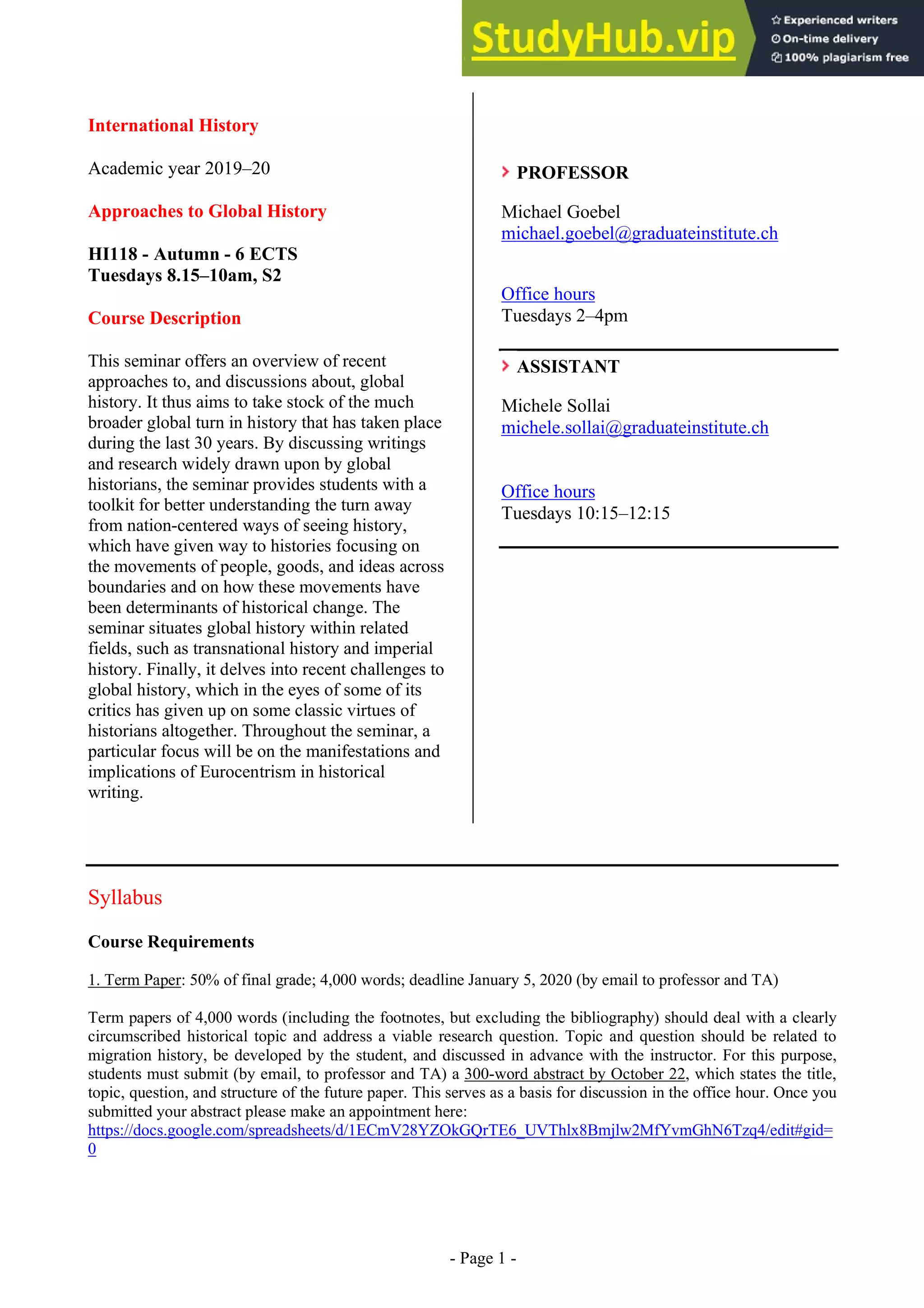
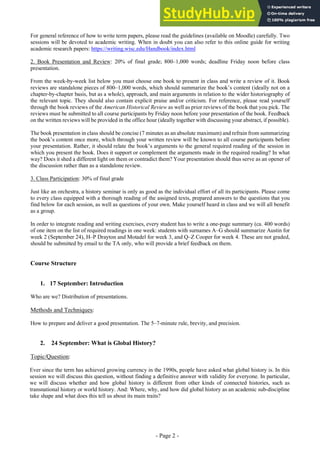
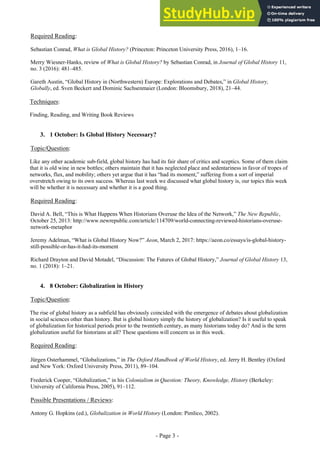
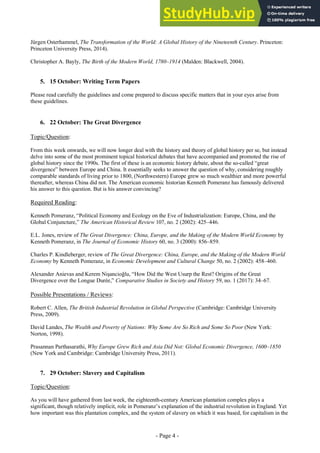
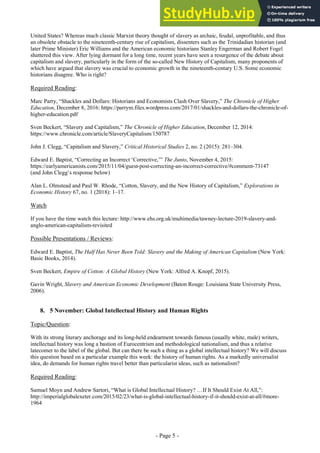
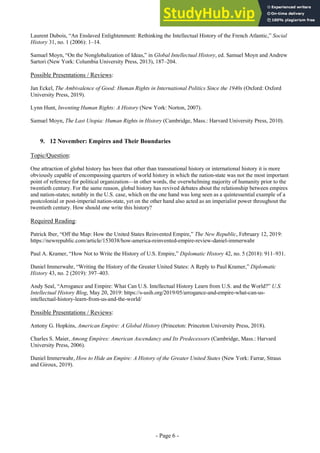
![- Page 7 -
10. 19 November: Eurocentrism
Topic/Question:
If global history has had a declared enemy it has always been Eurocentrism—a sometimes ill-defined concept that
can refer to undue historiographical attention to Europe (and North America?) to the detriment of other world
regions, the uncritical use of concepts derived from historical trajectories specific to Europe (and these concepts’
uncritical application elsewhere), and the normative assumption that Europe was somehow superior; or a
combination of these three. In this session we will discuss the origins, the interplay, and the escapability of these
three varieties of Eurocentrism.
Required Reading:
Dipesh Chakrabarty, “Postcoloniality and the Artifice of History: Who Speaks for ‘Indian’ Pasts?”,
Representations, no. 37 (1992): 1–26.
Alex Lichtenstein, “Decolonizing the American Historical Review”, The American Historical Review 123, no. 1
(2018): xiv–xvii.
Possible Presentations / Reviews:
Jack Goody, The Theft of History (Cambridge: Cambridge University Press, 2006).
John M. Hobson, The Eurocentric Conception of World Politics: Western International Theory, 1760–2010
(Cambridge: Cambridge University Press, 2012).
Martti Koskenniemi, The Gentle Civilizer of Nations: The Rise and Fall of International Law 1870–1960
(Cambridge: Cambridge University Press, 2001).
11. 26 November: International History
Topic/Question:
At least in the form of diplomatic history, international history is much older than global history and in some ways
has acted as a handmaiden for it. Today we will ask whether there are longer term roots in the history of
international relations and organizations that have helped bury Eurocentric notions of history and thus helped the
rise of global history avant la lettre.
Required Reading:
Mark Mazower, “The End of Eurocentrism”, Critical Inquiry 40, n. 1 (2014) 298–313.
Glenda Sluga, “The Transformation of International Institutions: Global Shock as Cultural Shock”, in The Shock
of the Global: The 1970s in Perspective, ed. Niall Ferguson et.al. (Cambridge, Mass.: Belknap Press of Harvard
University Press, 2010), 223–237.
Possible Presentations / Reviews:
Erez Manela, The Wilsonian Moment: Self-Determination and the International Origins of Anticolonial
Nationalism (Oxford and New York: Oxford University Press, 2007). [AVAILABLE ON MOODLE]
Susan Pedersen, The Guardians: The League of Nations and the Crisis of Empire (Oxford: Oxford University
Press, 2015). [AVAILABLE ON MOODLE]](https://image.slidesharecdn.com/approachestoglobalhistory-230805220318-87b7e412/85/Approaches-To-Global-History-7-320.jpg)
![- Page 8 -
12. 3 December: The History of Development
Topic/Question:
Closely linked, as well as equally tied to this institution, has been the history of development. A relatively recent
field of historical inquiry, the history of development has risen exponentially in recent decades, in tandem with the
global history boom. Following on from our earlier, more theoretical, discussions of Eurocentrism, in this session
we will ask more concretely about the implications of global history and of Eurocentrism for the writing of the
history of development.
Required Reading:
Frederick Cooper, “Writing the History of Development”, Journal of Modern European History 8, no. 1 (2010) 5–
23.
Corinna Unger, “Postwar European Development Aid: Defined by Decolonization, the Cold War, and European
Integration?”, in The Development Century: A Global History, ed. Stephen J. Macekura and Erez Manela
(Cambridge: Cambridge University Press, 2018), 240–259.
Possible Presentations / Reviews:
Jeremy Adelman, Worldly Philosopher: The Odyssey of Albert O. Hirschman (Princeton: Princeton University
Press, 2013).
Nils Gilman, Mandarins of the Future: Modernization Theory in Cold War America (Baltimore: Johns Hopkins
University Press, 2003). [AVAILABLE ON MOODLE]
James C. Scott, Seeing Like a State: How Certain Schemes to Improve the Human Condition Have Failed (New
Haven: Yale University Press, 1998). [AVAILABLE ON MOODLE]
13. 10 December: Class Taught by TA
14. 17 December: Digitization and Global History
Topic/Question:
This final session will be devoted to a rather different, more methodological, issue: What does the rise of global
history (and transnational history, if you will) owe to the everyday digitization of historians’ work environment?
Did we simply all jump on the global history bandwagon because it is so much easier to retrieve fine-grained
information about a previously little-known person in the eighteenth-century Caribbean than it was thirty years
ago? What kinds of anachronisms do we risk? And what gets lost through the digitization of our work?
Required Reading:
Lara Putnam, “The Transnational and the Text-Searchable: Digitized Sources and the Shadows They Cast”, The
American Historical Review 121, no. 2 (2016) 377–402.
Tim Hitchcock, “Confronting the Digital: Or How Academic History Writing Lost the Plot,” Cultural and Social
History 10, no. 1 (2013): 9–23.](https://image.slidesharecdn.com/approachestoglobalhistory-230805220318-87b7e412/85/Approaches-To-Global-History-8-320.jpg)